

Jorge González Alonso
University professor. E-Learning. Web 2.0, Web 3.0 Applications in Education. Social Networks. Technology for Teachers. Internet Marketing.
Storytelling in eLearning: The why and how. Every year, I have to complete training related to confidentiality policies (as a learner, not an as the instructional designer).
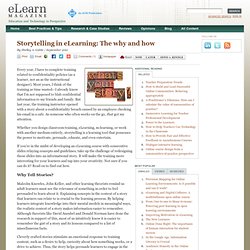
Most years, I think of the training as time wasted—I already know that I'm not supposed to blab confidential information to my friends and family. But last year, the training instructor opened with a story about a confidentiality breach caused by an employee checking his email in a cafe. As someone who often works on the go, that got my attention. Whether you design classroom training, eLearning, m-learning, or work with another medium entirely, storytelling is a learning tool that possesses the power to motivate, persuade, educate, and even entertain.
If you're in the midst of developing an eLearning course with consecutive slides relaying concepts and guidelines, take up the challenge of redesigning those slides into an informational story. Why Tell Stories? How Do I Write a Story? When asking probing questions, keep the basic elements of a story in mind. Connectivism and PLN. Peter Sloep said in Google + “Where I definitely do disagree with her is that PLNs are founded in the theory of Connectivism.
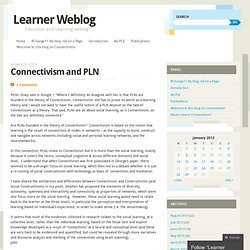
Connectivism still has to prove its worth as a learning theory and I would not want to have the useful notion of a PLN depend on the fate of Connectivism as a theory. That said, PLNs are all about social learning, as is Connectivism, so the two are definitely connected.” Are PLNs founded in the theory of Connectivism? Connectivism is based on the notion that learning is the result of connections of nodes in networks – as the capacity to build, construct and navigate across networks (including social and personal learning networks, and the neuronetworks). In this connection, PLNs relate to Connectivism but it is more than the social learning, mainly because it covers the neuro, conceptual (cognitive & across different domains) and social level. Mahara-Moodle. Learning Design and Complexity Science. My response to Jenny’s post on OLDSMOOC Design: Hi Jenny and Roy, I agreed with what Roy said, that you are a learning designer if you do all those things in a course, in an adaptive manner.
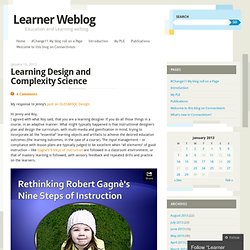
What might typically happened is that instructional designers plan and design the curriculum, with multi-media and gamification in mind, trying to incorporate all the “essential” learning objects and artifacts to achieve the desired education outcomes (the learning outcomes, in the case of a course). The input management – or compliance with lesson plans are typically judged to be excellent when “all elements” of good instruction – like Gagne’s 9 steps of instruction are followed in a classroom environment, or that of mastery learning is followed, with sensory feedback and repeated drills and practice on the learners.
A summary of xMOOCs. Content marketing software that works. Inside Facebook - Tracking Facebook and the Facebook Platform for Developers and Marketers. The Facebook Blog. Cloud - A simpler way to deliver e-learning - SCORM. A simpler way to deliver e-learning.

SCORM Cloud lets you deliver training where your learners live. Try it Free. Does creativity come with a price. I am interested in creativity and creative learning, and so it would be interesting to understand how these would be associated with creative people and how we could provide education to nurture one’s creativity. In this post on Creativity – Does Creativity come with a price, it was found that writers were more likely to suffer from mental disorders: Writers were a whopping 121% more likely to suffer from bipolar disorder than the general population. #CFHE12 #Oped12 A reflection of MOOCs Part 4:The number one challenge in education – Cheating. I was appalled by what this post tells us about – stories of cheating. Test taking by others is a cheating scandal that would damage education’s reputation. Cheating in research is also on the rise. In this post on MOOC cheating: Does creativity come with a price? Part 2. This is part 2 on creativity.
In this creativity closely entwined with mental illness: As a group, those in the creative professions were no more likely to suffer from psychiatric disorders than other people.But they were more likely to have a close relative with a disorder, including anorexia and, to some extent, autism, the Journal of Psychiatric Research reports. Connections: Deconstruction and Connectivism. I haven’t really spent much time with modern French philosophers. They vex me and use many words to say few, but ambiguous, things. However, I’ll spend time revisiting Derrida and others (notably Latour, but he is a sociologist, so I have more tolerance), especially after a student in the MDDE622 course that Rory McGreal and I taught at Athabasca University, posted an interesting learning module on Deconstruction and Connectivism.
Stella Bastone agreed to share the module. From the module: According to Derrida, all Western thought is based on the idea of a center…Deconstruction challenges this. MOOCs for K-12 – Are you ready. Are we ready to adopt MOOC in K-12 education? No, I don’t think we are ready yet. I have posted here in 2008 on the application of Connectivism in K-12 and Higher Education, based on an institutional approach. I have left with more questions than answers: Surely with the CCK08, if 2 “teachers” could serve 2000 plus learners, do you think there is a need to employ more teachers/moderators in mass open on-line courses? #CFHE12 #Oped12 A reflection on the cMOOCs and xMOOCs and their future. When I reflect upon the two MOOCs – xMOOCs and cMOOCs in terms of how the courses are structured, I come to a conclusion that: In xMOOCs, the professors plan out everything for the participants, the video lectures, the artifacts & resources, the forum and discussion boards, the assignments, the quizzes, the examination, the assessment rubrics, and even the “recommendations and referencing link” to potential employer.
Every learning is under a prescriptive regime, that if the participants follow the instruction, study the learning materials, watch the video lectures, then they could be able to master the content, and thus get a certificate if they satisfy the minimum requirements for the course. Here Keith Devlin explains how it works, with his MOOC. Sounds too good to say YES, right? Dave Cormier explains how a MOOC works here: There are more than two millions Courserians in Coursera, there would be another few millions joining these MOOCs soon, as the competitions go on.
Like this: #CFHE12 #Oped12 Fractals, Community and Openness in Education. How would communities develop? It looks like fractals development on an ongoing basis. Keith says in his post: an alert to Michael Rose’s explainer about fractals in The Conversation.In the explainer, Michael quotes Benoit Mandelbrot “Bottomless wonders spring from simple rules which are repeated without end“. How would you respond to adverse condition. What could an educator or learner do in respond to adverse working or learning condition?
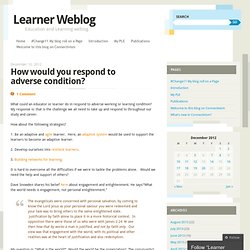
My response is: that is the challenge we all need to take up and respond to throughout our study and career. How about the following strategies? 1. The future of MOOCs. MOOCs get a bad rap.
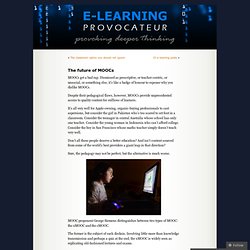
Dismissed as prescriptive, or teacher-centric, or unsocial, or something else, it’s like a badge of honour to espouse why you dislike MOOCs. Despite their pedagogical flaws, however, MOOCs provide unprecedented access to quality content for millions of learners. It’s all very well for Apple-owning, organic-buying professionals to cast aspersions, but consider the girl in Pakistan who’s too scared to set foot in a classroom. Consider the teenager in central Australia whose school has only one teacher. #CFHE12 #Oped12 What is critical in MOOC. I have a dream.
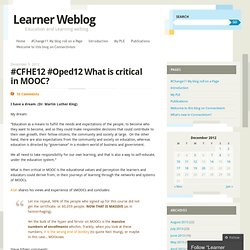
(Dr. Martin Luther King) My dream: “Education as a means to fulfill the needs and expectations of the people, to become who they want to become, and so they could make responsible decisions that could contribute to their own growth, their fellow citizens, the community and society at large. On the other hand, there are also expectations from the community and society on education, whereas education is directed by “governance” in a modern world of business and government. We all need to take responsibility for our own learning, and that is also a way to self-educate, under the education system.” #CFHE12 #Oped12 Emergence of MOOCs Final Part 5 xMOOCs meeting the cMOOCs. #CFHE12 #Oped12 The emergence of MOOCs part 4 Assessment, Certification and Accreditation.
Are MOOCs suitable for all disciplines?
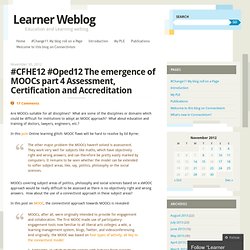
What are some of the disciplines or domains which could be difficult for institutions to adopt an MOOC approach? How to Calculate the Value of Your Social Media Followers [CALCULATOR] Building Chrome Apps and Extensions for Fun and Profit. Networked Society. #CFHE12 #Oped12 MOOCs Emerging as Landscape of Change Final Part (Part 8) – The Conversation. This is my final part of the series, where I try consolidating some of the conversations around MOOCs.
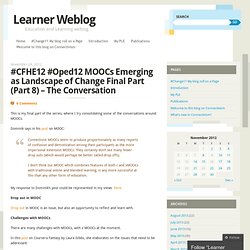
#CFHE12 #Oped12 Massive Open Online Comments (MOOC) are re-defining MOOCs – Part 1. 2b2k] MOOCs as networks. Posted on:: November 16th, 2012 Siva Vaidhyanathan [twitter: sivavaid] has a really well-done (as usual) article that reminds us that for all the excitement about Massive Open Online Courses — which he shares — we still have to figure out how to do them right.
![2b2k] MOOCs as networks](http://cdn.pearltrees.com/s/pic/th/joho-blog-2b2k-moocs-networks-44760999)
#CFHE12 #Oped12 MOOCs Emerging as Landscape of Change Part 7 Commodity, Business, Community, Community of Practice. #CFHE12 #Oped12 MOOCs emerging as Landscape of Change – Part 5 Questions & Openness with MOOC. Sustainability and MOOCs in Historical Perspective. Understanding the New Roles in Marketing. 4 Advanced Targeting Techniques Every Facebook Advertiser Should Master.
Not everyone “Likes” the Facebook ads platform (pun intended). Its CTRs are lower than Google, it doesn’t convert as well, and it’s just, well ... different. And if you’re not already using Facebook Ads (or you’ve tried in the past and failed), you may have noticed there’s not a whole ton of advice out there that helps to explain why Facebook ad campaigns flatline. #CFHE12 #Oped12 MOOCs emerging as Landscape of Change – Part 2. Creative Classrooms: Rethinking How We Teach and Learn. Emergence of MOOCs – Part 3 MOOCs as SURPRISES! #Change11 New Learning Initiative with MIT and Future of Education and Learning. The emergence of MOOCs: part 2 – The future of education and learning. MOOCs. Google Drive Blog - Comodo IceDragon. #CFHE12 #Oped12 The emergence of MOOCs – Part 1. #Oped12 #MOOC Have people really understood what a great MOOC would look like? Sinapsis ele - Comodo IceDragon. The Connective Learning Environment. The Semantic Social Network. Whose Connectivism?
What is the highest form of learning. Why Do I Share My Knowledge? Facebook incursiona en el comercio electrónico. MOOC is on the BIG Move. Half an Hour. OECD Exam For Students Around The World: Could You Pass The Test? Concepts. Critical Thinking. Hard work, Smart work and Genius work. In MOOCs: More is less and less is more (Part 3) In MOOCs, more is less, and less is more (Part 1) Research analytics at your finger tips…. Is proctored examination the solution for accreditation of xMOOCs. Caught between a MOOC and a hard place. Designing and running a MOOC (in 9 easy steps) Will your connectivity and influence be determined by a Score. How to Replace Top-Down Training with Collaborative Learning (3) Is MOOC about Community Building. What does teaching for meaningful learning mean. The c MOOC as knowledge ecologies. Thinking about MOOCs. MOOCS. Designing a Learning Design MOOC.
Mics in the classroom: news and resources round up. ALT Online Newsletter. Three Kinds of MOOCs « Lisa's. EPIC 2020: Higher Education in the Year 2020. The John William Pope Center for Higher Education Policy. 15 Fascinating Ways to Track Twitter Trends. Free and Open Source Authoring Tools for e-Learning. Learning Object Tools. NEW READING OPPORTUNITIES IN MOOCDOM ~ CDL Projects. #MOOCMOOC Reflection on different MOOCs.
Bloom Taxonomy. Tercera Edad - Google News. Tercera Edad en Internet. Educación en linea. Síndrome de Down. Síndrome de Down. Noticias. Moodle - Google News. M-Learning. CrearVirtual. Debate sobre temas educativos. CrearVirtual. Educación en América Latina - Google News. Educational Technology - Google News. Crear Virtual. Education News. Scribd. Discover Yourself! Edit profile (SlideShare is the best place to share powerpoint presentations) CCEE - EduInicio.